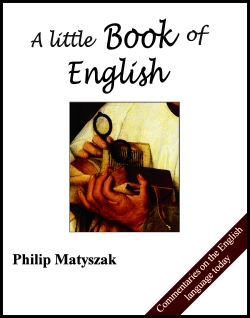|
The earlier Prof blog entries as well as some new articles are now available as a Kindle book from Amazon. We hope you enjoy it.

amazon.com amazon.co.uk
|
| 15 May 2024 | | RAP Artists | 'I think my HRT therapy made me forget my PIN number when I was at the ATM machine last week'.
The above sentence is an example of RAP phrases in action. By RAP here I don't mean the music of Snip Doggy-doo or any of the other strangely named artists in the genre. Instead I refer to what lexicologists call a Redundant Acronym Phrase phrase. Note that second 'phrase' in the previous sentence. This is not a typo but an example of deliberate humour in the world of English grammarians. (Given the chaotic nature of English grammar as a whole, examples of unintentional humour abound.)
What this type of RAP phrase does is deliberately repeat the redundancy which one finds hanging around the end of many English-language acronyms. This happens when people refer to things like 'The NATO organization' without considering what the 'O' in NATO stands for. (Or the 'T' in 'HRT', or the 'N' in 'PIN' or …)
Other common RAP phrases include 'LCD displays' the 'HIV virus', and – particularly – the 'NHL hockey league'. These phrases are not necessarily a bad thing. The SALT talks were the Strategic Arms Limitation Talks, aimed at reducing the risk of nuclear warfare. Yet without the helpful repetition of 'talks' at the end, many viewers would be wondering why the reporter on TV had interrupted a vital discussion to mention food condiments.
Condiments, of course, can only be added to food, rendering 'food' in the above sentence redundant. Which brings us to the other type of RAP phrase. This involves other languages already meaning the bit that we helpfully translate into modern English anyway. Geography suffers particularly from this form of RAP phrasing – as in the River Avon, the Sahara Desert, Mount Fujiyama, and the Rio Grande River – which translate as the River river, the Desert desert, Mount Fuji mountain and the Big River river. | | | | | 15 March 2024 | | I don't not love Winnipeg | The above was uttered by an American sports star who was asked his opinion of a Canadian city he had evidently barely heard about. It is an instructive use of what is called a 'double negative'. In many languages a double negative reinforces the negativity. 'Non ho fatto niente' ('I never did nothing') Is an Italian's way of saying that he really, really did not do anything. However, in English the two negatives cancel out, with the strict English meaning being that the speaker did indeed do something.
However, in colloquial English the double negatives do add emphasis – as in the Rolling Stones song 'I can't get no satisfaction'. Working out whether an English double negative comes to a positive depends, like so much in the language, on the context in which the words are spoken and the colloquial language of the speaker.
There's another usage as well, which is more subtle. It means that the speaker did something that he was not expected to do. If an ex-boyfriend of the bride says 'I didn't not go to the wedding', this shows that people expected him to be absent but he went anyway. Alternatively it might be something the speaker didn't want to do, but did anyway. 'I couldn't just not think about it.'
Also a speaker can express weak agreement by using a double negative or a negative denying a negative viewpoint. For example if an expert says of something 'It is not impossible', he means that while the thing is possible, it is also very unlikely. Such sentences are often followed by a qualification – 'I can't say that he was not there' is probably going to be followed by something like 'But no-one saw him arrive.'
So our sportsman, when put on the spot about his feelings for Winnipeg, here attempts a compromise. He doesn't want to say he loves Winnipeg, because he doesn't even know the place. But he wants to be clear that he doesn't hate the city either – he might even love it if he knew it better.
Perhaps the best way to look at a double negative is by using one here. A double negative is not quite an affirmative, but it is also not not an affirmative. | | | | | 15 January 2024 | | A wicked post |
This post is evil, horrible and disgusting. And that's going to be a good thing. You see, here at the Profblog we like to stay ahead of the curve, and it's only a matter of time before these pejoratives become positives. Don't believe me? Take a look at 'wicked'. That's the 'wicked' with stress on the '-ed', not the one that describes things like candles. It's the 'wicked' of evil witches, of cruel, immoral impure reprobates. Yet ask children today if they would like their computer gaming skills to be 'wicked' and watch their little faces light up. 'Yeah', they'll say, 'That would be neat. It would be sick!'
In the modern lexicon of cool-speak 'wicked' has a parallel meaning as something particularly good or enjoyable. A wicked camping trip is not attending an outdoor satanic ritual but an exceptionally fine woodland experience. This is perhaps explicable. Those on the wrong side of an adversary's competitive skills may indeed think of their opponent's abilities as 'wicked' and from a puritan standpoint anything very enjoyable and fine must by definition be bad.
Which brings us to 'insane'. This now can mean something so good that it defies rational belief. A really good party is insane. So is a top-flight footballer's skill with a ball. So in the modern world a top tennis player can be wicked and insane – yet with any resemblance to a depraved psychopath being purely co-incidental.
There seems however no logical reason for 'sick' other than a fashionable desire for 'yoofspeak' to be different from adults and people who are not TV presenters. For the same reason a decade ago 'bad' was a synonym for 'good'. There's also some potential confusion here. A recent sci-fi TV episode had an engineer telling the captain 'Ma'am, (modern starship captains are female) your ship is sick.'
'Thank you', says the gratified commander.
A brief pause.
'Let me put that another way', says the engineer.
| | | | | 15 November 2003 | | Idiomatic clothing from top to bottom | English as a language has always taken everyday actions and turned them into idioms for more complicated ideas. Few things are more everyday than clothing – we seldom go through a day without getting dressed. So it is not unexpected that many idioms involve what we wear. Here is a small (threadbare, even) sample that won't wear you out.
'Tip my hat' – you do this for a person or idea that you respect. For example 'I don't like Fred, but I tip my hat to him for standing up to that bully.'
'Get collared' – caught by the authorities. For example 'She was collared for shoplifting when a frozen chicken dropped out from under her dress.'
'Lose your shirt' – Lose all your money. For example 'He lost his shirt on a wild bet at the horse races.' (You can also 'keep your shirt on' by not losing your temper, and 'get shirty' by becoming irritable.)
'Belt' – As a noun it keeps your trousers up. As a verb it's an idiom for 'To hit' or simply do something energetically. For example ''Janet belted John when he belted out songs too loudly on his guitar.'
'To wear the trousers' – To be the one who takes charge in a relationship. 'Janet wears the trousers in that household. John does as he is told.'
'The shoe is on the other foot' The situation has completely changed around. 'John used to take orders from Janet, but since he inherited a million pounds the shoe has been on the other foot.' | | | | | 15 September 2023 | | Clitics within Malaphors |
"On YouTube last week this $%^!!%* individual was manipulating, cheating and deceiving. His Make Munny Fasta scheme would make millions – for himself while bankrupting others. His idea that you shouldn't keep your golden egg under the mattress was clearly stolen from the July 2023 edition of Money Makers Magazine."
Perspicacious readers will have noted that this is a language blog and not a financial column, and from this they will have (correctly) deduced that the above paragraph is an illustration of some grammatical point. More particularly the text demonstrates respectively the use of Bicapitalization, Grawlix, Diazeugma, Allegro formation, Dirimens copulatio, and a Clitic within a Malaphor. We finish with a Mountweazel.
These excellent words deserve to be brought more into public view, so feel free to drop them into conversation at dinner parties or – in the case of 'diazeugma' on to the double world score in Scrabble.
So, the definitions: Bicapitalization is straightforward enough – it's when a word contains more than one capital letter. The wonderfully evocative 'Grawlix' is where punctuation marks are substituted for profanities. When a series of verbs or participles are linked to the same subject we have Diazeuguma, while Allegro formations - beloved of brand creators – deliberately misspell words.
Dirimens copulatio balances two differing ideas, while a malaphor is a metaphor gone wrong. The example given here contained the clitic 'n't' which is a letter formation with it's own meaning that can't stand alone.
To foil plagiarists of this article I could have included a pseudoword such as 'c'monoffit'. That way, if anyone else uses this made-up word (with clitic!) I know they're cheating. Such fake references, sometimes used in academic articles maps and dictionaries, are called Mountweazels.
| | | |
page 1 page 2 page 3 page 4 page 5 page 6 page 7 page 8 page 9 page 10 page 11 page 12 page 13 page 14 page 15 page 16 page 17 |
|
|

